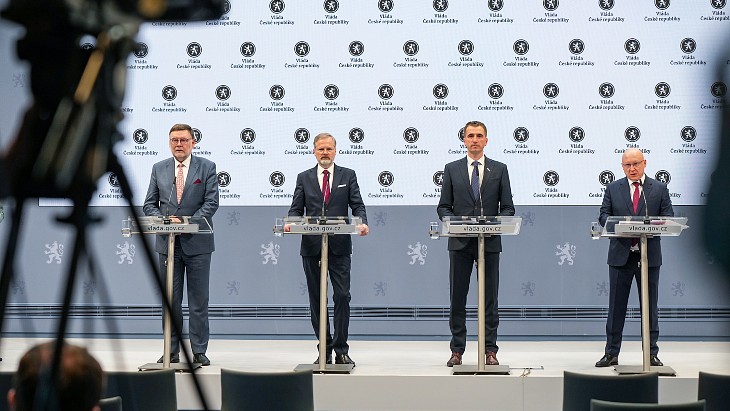At a cabinet meeting on Wednesday the government decided to purchase 80% of shares in the Elektrárna Dukovany II project, with CEZ retaining a 20% stake. The 80% stake was valued at CZK3.6 billion (USD163 million).
It also approved a state loan to cover the construction, which will be repaid over a period of 30 years beginning from the issuing of a permit to operate the first of the new units.
The Czech Government will require European Commission approval of the financing method and investor model "which we expect to happen around 2026. Until then, the company Elektrárna Dukovany II will be financed by a bridging commercial loan".
Prime Minister Petr Fiala said: "Since the beginning of our government, we have been working to ensure the energy security and self-sufficiency of the Czech Republic for future generations. Nuclear energy, especially the construction of new nuclear sources, is strategically important for the future of the Czech Republic. The state's takeover of an 80% stake in EDU II will enable the implementation and financing of this project."
Finance Minister Zbyněk Stanjura said: "The state's majority stake will ensure control over the entire project and will probably simplify the process of approving state aid by the European Commission, the so-called notification. The minority stake of ČEZ then guarantees support from the professional capacities of the ČEZ Group."
Minister of Industry and Trade Lukáš Vlček said: "The construction of new nuclear units represents a huge opportunity for our economy and the renaissance of the nuclear industry. The share of Czech industry in the order is approaching 60%, and when the contract is signed with the preferred supplier, the Korean company KHNP, contracts and agreements with Czech companies in the volume of approximately 30% will be concluded. Exactly as we agreed with KHNP during our February meeting in Seoul."
CEZ CEO Daniel Beneš said: "This step will also enable CEZ Group to implement additional investment projects focused on long-term competitiveness, sustainability and safety. Thanks to its unique experience with the construction and subsequent almost 40 years of safe operation of two nuclear power plants, CEZ is ready to provide its capacities and know-how for the preparation and construction of new sources."
Fiala, posting on social media, said that thanks to the decisions taken on financing, contracts with KHNP could be signed on 7 May.
The background
The Czech Republic currently gets about one-third of its electricity from the four VVER-440 units at Dukovany, which began operating between 1985 and 1987, and the two VVER-1000 units in operation at Temelín, which came into operation in 2000 and 2002.
In October 2023, Westinghouse, EDF and KHNP submitted binding bids for a fifth unit at the Dukovany nuclear power plant, and non-binding offers for up to three more units - another one at Dukovany and two at the Temelin nuclear power plant. Westinghouse was proposing its AP1000, EDF was proposing its EPR1200 reactor, KHNP was proposing its APR1000. But in February 2024 the Czech government announced it was changing the tender to be binding offers for four new units, with Westinghouse not included because it "did not meet the necessary conditions".
Prime Minister Petr Fiala explained at the time that the decision to switch to binding offers for all four units was the result of the original tender suggesting that contracting for four units, rather than having separate processes, could have a 25% benefit in terms of costs.
In July last year, he announced KHNP as the preferred bidder, with contract negotiations to begin with the aim of signing contracts for the initial unit by the end of March 2025 - the target for test operation of the first new unit is 2036 with commercial operation in 2038. He said the winning tender "based on the evaluation of experts, offered better conditions in most of the evaluated criteria, including the price". The KHNP bid was for a cost of around CZK200 billion (USD8.6 billion) per unit, if two units were contracted.
Both EDF and Westinghouse appealed to the Czech Republic's competition authorities about the selection process - Westinghouse later withdrew its appeal and EDF's was rejected by the competition office last week.






_55401.png)
_23009.jpg)







